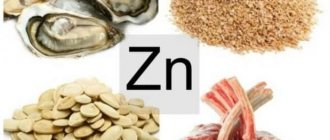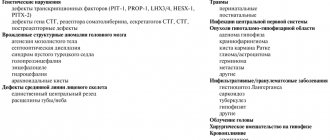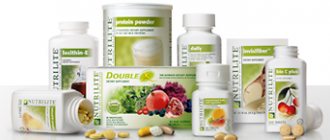Rational nutrition is the most important condition for maintaining health, normal growth and development of the human body. For normal functioning, the body requires a daily supply of not only basic nutrients (proteins, fats, carbohydrates) and water, but also many biologically active compounds - vitamins, microelements, minerals. An unbalanced diet, chronic stress, bad habits, concomitant diseases - all this can lead to a lack of vitamins, including B vitamins. Vitamins are not produced or are produced in insufficient quantities in the human body, which means they must be supplied with food. , in the required quantities. Insufficient intake of vitamins can occur under the influence of various factors - for example, diabetes, alcohol abuse, since alcohol reduces the absorption of vitamin substances in the gastrointestinal tract, various diseases of the digestive system, in which the absorption of nutrients is impaired.
Pyridoxine: what kind of vitamin?
The main role of the vitamin is to take part in protein metabolism. In addition, pyridoxine is necessary for carbohydrate and fat metabolism in the human body. Helps maintain the balance of potassium and sodium, which is especially important for the central nervous system, and stabilizes muscle function. If there is a lack of vitamin in the body, inflammatory processes in the middle ear may begin.
It is worth keeping in mind that pyridoxine is negatively affected by sunlight, water and high temperatures. Therefore, products that contain the vitamin should not be boiled or heat-treated.
Daily values of B vitamins
When answering the question of how much B vitamins you need to get, you need to take into account the characteristics of your environment, gender, age, the presence of certain diseases, and increased physical or emotional stress on the body. The table below shows average standards.
| Vitamin name | Need for children | Requirement for adults/mg/day |
| B1 | 0,2-0,9 | 2 |
| B2 | 0,4-1,8 | 1,5-2 |
| B3 | 2-12 | 20 |
| B5 | 1-5 | 4-6 |
| B6 | 0,2-1 | 1,3 -2 |
| B7 | 5-20 | 30 |
| B9 | 0,05-0,15 | 0,2-0,26 |
| B12 | 0, 0004-0,0018 | 0,0025 |
B vitamins are classified as water-soluble compounds. This means that it is almost impossible to “eat your fill” with them. Substances are not stored in adipose tissue, but leave the body. The likelihood of hypervitaminosis against the background of a balanced diet is low.
Excess may also develop in response to long-term use of synthetic drugs. The main manifestations of hypervitaminosis include:
- hyperemia of the skin;
- allergic reactions;
- diarrhea, abdominal pain;
- sleep disorders;
- cramps in the muscles of the arms/legs;
- headache.
Consequences of shortage
Due to a lack of vitamin B6 in the body, the following problems may occur:
- weakened immunity. Lack of pyridoxine leads to a decrease in antibodies that protect the body from harmful microorganisms;
- lack of glucose. In this case, fatigue, irritability appear, and sleep is disturbed. It happens quite often in pregnant women;
- imbalance of sodium and potassium. This usually results in swelling of the face, arms and legs. Sometimes the belly may become larger, which is not the cause of excess weight;
- problems with protein absorption. The lack of protein is associated not only with an insufficient supply of this useful substance, but also with a deficiency of pyridoxine. If you consume too many protein foods, their absorption may take up all the vitamin B6 that is present in the body.
Why is vitamin B6 needed and who is especially recommended to take it?
The main guarantee of good health and excellent well-being is an active lifestyle and a balanced diet, which influence a person’s magnificent appearance.
By eating certain foods, you can get a whole range of nutrients, vitamins and minerals, the lack of which leads to the development of diseases and deterioration of metabolic processes. Vitamins B6 containing pyridoxine play a special role in the synthesis of protein necessary for the human body, maintaining normal metabolism and reducing cholesterol levels in the blood and the absorption of fatty acids. This element is classified as water-soluble and quickly removed from human internal organs, so it is important to constantly nourish the body with it, which requires vitamin B6, which is an alternative to many food products.
Who should take it?
Vitamin B6 will be especially useful for the following categories of people:
- girls who use contraceptives or other means that contain estrogen;
- women in position. An excessive amount of estrogen appears in the body of a pregnant woman. Pyridoxine helps correct the situation;
- girls in the last 14 days before menstruation. There is also too much estrogen in the body;
- people who want to get rid of extra pounds;
- teenagers who have problem skin;
- patients with high blood sugar levels;
- persons with mental illness.
Sources, role and symptoms of hypovitaminosis
B vitamins include: B1, B2, B3, B5, B6, B7, B9, B12. Previously, these included compounds B4 (choline), B8 (inositol). Levocarnitine has also been mistakenly called vitamin B11.
Vitamin B1 - thiamine
Takes part in the metabolism of carbohydrates and a number of amino acids, is important for the nervous, cardiovascular systems, and liver cells. Vitamin B1 is not synthesized in the body; it requires regular intake from food to meet its needs. They are rich in wheat sprouts, rye bread, various seeds and nuts, brown rice, legumes, and sea buckthorn berries. Animal sources include pork, chicken, salmon, and eggs.
Symptoms of vitamin B1 deficiency develop during fasting, unbalanced diet and manifest themselves in the form of severe neurological disorders (beriberi disease):
- pain in the calf muscles;
- decreased deep and cutaneous sensitivity of the legs and feet;
- paresthesia in the legs (tingling, goosebumps);
- sleep disturbances, emotional instability;
- decreased memory and mental performance.
In patients with anorexia and alcoholism, symptoms of B1 deficiency (acute Gaye-Wernicke encephalopathy, Korsakoff syndrome) can develop acutely. The clinic shows severe motor disturbances, visual disturbances, confusion, and psychotic symptoms. Without emergency help, a person can die within a few days.
Vitamin B2 - riboflavin
This is a source for creating enzymes that participate in the synthesis of vitamin B6 derivatives, reactions with acids, break down foreign and dangerous compounds, and are responsible for the state of hemoglobin in the body.
So it is necessary for:
- maintaining healthy skin, hair nails;
- formation of red blood cells and antibody proteins;
- regulation of reproductive function.
The main sources of B2 are food of animal origin - kidneys, liver, eggs. It is found in smaller quantities in porcini mushrooms and champignons, broccoli, almonds and cottage cheese.
Anorexia, vegetarianism, inflammatory diseases of the gastrointestinal tract, alcoholism, taking sulfur preparations or tranquilizers can provoke hypovitaminosis B2.
Its clinical manifestations are as follows:
- angular stomatitis (“jams”, ulcers in the corners of the mouth);
- dryness and cracks in the mucous membranes of the lips;
- glossitis (swelling, redness of the tongue);
- conjunctivitis or keratitis (red eyes, photophobia, decreased vision);
- dermatitis on the skin of the face (eyelids, nasolabial folds, ears, nose);
- weakness, fatigue, drowsiness;
- muscle pain and muscle weakness;
- anemia.
B3 - niacin
Other well-known names for the vitamin include nicotinic acid and vitamin PP. The substance takes part in cell division, protein synthesis, hormones, cellular respiration and many other processes. With the participation of this vitamin, steroid hormones and fatty acids are formed. In addition, B3 has a vasodilating effect, heals wounds, and reduces the concentration of cholesterol in the blood (primarily “dangerous” fractions).
The source of the vitamin is the essential amino acid tryptophan. Rich foods include: liver, tuna, turkey, brewer's yeast. You can also get B3 by adding whole grains to your diet: oats, rye, barley, wheat germ, peanuts.
Heat treatment reduces the vitamin content in food, and love for refined carbohydrates increases the need for it.
The unusual name “vitamin PP” is an abbreviation of two English words “preventive pellagra”, which means “preventing pellagra”. Signs of deficiency are described as a disease of the “three Ds”: diarrhea, dermatitis, dementia. They occur with prolonged hypovitaminosis. Clinical manifestations are more extensive and include:
- dermatitis, increased skin sensitivity to sunlight, baldness;
- walking impairment, neuritis, paralysis of limbs;
- weakness and fatigue, headaches;
- from the psyche: asthenia, sleep disturbances, aggression, dementia;
- heart damage - dilated cardiomyopathy.
Vitamin B5 - pantothenic acid
The biologically active substance is involved in the metabolism of proteins, fats and carbohydrates. It stimulates the adrenal cortex to increase the secretion of corticosteroids. The vitamin is involved in the synthesis of antibodies, normalizes lipid metabolism, and restores the integrity of the skin and mucous membranes.
A smaller part of B5 enters the body with food: egg yolk, yeast, milk, carrots, caviar, green salads. The main amount of the vitamin is synthesized by intestinal flora. This fact explains the occurrence of its deficiency against the background of long-term use of antibacterial or synthetic sulfonamide drugs and malabsorption syndrome. in which the absorption of substances is impaired.
Hypovitaminosis manifests itself in the form of metabolic disorders, damage to the digestive tract, skin and nail diseases, and weakened immunity.
Patients usually complain of:
- fatigue, headaches;
- deterioration of skin condition;
- low mood;
- muscle pain;
- numbness and pain in the feet;
- nausea, digestive disorders;
- frequent viral infections.
Vitamin B6 – pyridoxine
Participates in the formation of red blood cells and the hemoglobin they contain. Being a coenzyme of proteins that process amino acids (primarily in the nervous system) it helps cells properly utilize and consume glucose, preventing sudden surges in blood sugar. The effect on the body is to maintain physical and mental performance, ensuring trophic innervation of the nervous system.
Therefore, deficiency primarily manifests itself in the form of symptoms such as:
- depression, lethargy;
- decreased resistance to any load;
- numbness, paresthesia in the arms and legs;
- joint pain, arthritis;
- muscle weakness;
- “jams” in the corners of the mouth, hair loss.
Hypovitaminosis occurs against the background of an unbalanced diet (diet, alcoholism), taking the B6 antagonist drug ftivazid. An increase in the need for B6 is possible during antibiotic treatment, smoking, and hormonal contraceptive therapy.
Pyridoxine is found in green plants, nuts, tomatoes, strawberries, lemons, oranges, and legumes. Animal sources include eggs, liver, fish.
Hypervitaminosis occurs due to the consumption of large doses of B6 and is characterized by a decrease in protein concentration in tissues: weakness, confusion, convulsions. Scientists have proven that an overdose of this vitamin increases the risk of developing lung cancer in men.
Vitamin B7 - Biotin
Regulates all types of metabolism, participates in the synthesis of the structural protein collagen, and the transfer of carbon dioxide molecules. Contained in egg yolks, beef liver, bananas, brown rice, citrus fruits, apples, parsley. Most of the vitamin is synthesized by intestinal flora.
Biotin deficiency develops against the background of strict diets, taking antibiotics, using preservatives E221-E228, and alcoholism.
Signs of deficiency will be:
- anemia;
- dryness, flaking of the skin;
- dermatitis in the corners of the mouth;
- anorexia, nausea;
- weakness, apathy, increased drowsiness;
- high levels of fat and glucose in the blood.
Hereditary diseases associated with impaired vitamin metabolism are also possible. They manifest in the neonatal period or in older children. Among the alarming symptoms are seizures, delayed physical and mental development.
Vitamin B9 - folic acid
Responsible for cell growth and maintaining DNA integrity. The vitamin has an effect on the development of the nervous system and is involved in hematopoiesis. Folic acid enters the body with food and is synthesized by bacteria in the intestines. Sources of B9 - spinach, asparagus, broccoli, pork and chicken liver, legumes.
Vitamin deficiency is most dangerous during pregnancy, as there is a risk of miscarriage and deformities in the fetus. The risk group includes:
- women with folate metabolism disorders, when B9 is less absorbed by the body;
- pregnant women receiving treatment with valproic acid (anticonvulsant) drugs.
But hypovitaminosis is dangerous not only for special categories of people. An increased need for B9 occurs during therapy with anti-malaria drugs and cytostatics (Fansidar, Methotrexate).
You can suspect a vitamin deficiency if you have the following symptoms:
- infertility in men and women;
- early miscarriages;
- fetal development abnormalities;
- decreased mental performance;
- megaloblastic anemia (by blood test).
Substance B10 or para-aminobenzoic acid is a fragment of vitamin B9; its properties have not been fully studied, and there are no clinical studies on the need for prophylactic use.
Vitamin B12 - cyanocobalamin
It is absorbed and works only when taken with animal food or as part of medications in the small intestine. Cyanocobalamin is also produced by bacteria in the large intestine, but the body cannot absorb it.
The substance participates in the oxidation reactions of proteins and fats. Food sources of cyanocobalamin are pork, beef liver, herring, mackerel, eggs, cheese, cottage cheese.
A complete rejection of animal products that contain the vitamin leads vegans to the development of megaloblastic anemia. The following also suffer from vitamin deficiency:
- patients with diseases of the ileum, helminthiases (absorption is impaired);
- persons with Castle factor deficiency (produced in the stomach and activates B12).
Hypovitaminosis is associated not only with pathologies of hematopoiesis, but also with the destruction of the myelin sheaths of nerve fibers, and depressive syndrome in the elderly.
Indications for use
Vitamin B6 is often prescribed for the following conditions and problems:
- toxicosis during pregnancy;
- premenstrual period;
- diseases of the central nervous system, mental disorders;
- acute and chronic gastritis;
- anemia;
- skin diseases;
- in order to prevent negative effects as a result of taking various medications.
An acute lack of vitamin is observed in alcoholism and taking oral contraceptives.
The role of the substance in maintaining normal human life
Due to their good solubility in aqueous and alcoholic media, rapid destruction under the influence of light, but resistance to oxygen and heat treatment, vitamins B6 do not accumulate in internal organs. This leads to a deficiency of pyridoxine, which causes health problems and deterioration in well-being, because these B vitamins are responsible for many important life support processes:
- participate in the synthesis of protein, neurotransmitters and essential enzymes;
- strengthen the heart muscles and ensure the production of hemoglobin;
- promote the conversion of folic acid into its active form;
- practically improve the absorption of valuable fatty and unsaturated acids;
- influence cholesterol levels, stabilizing its content in the blood;
- responsible for the formation of antibodies that strengthen human immunity;
- ensure full-scale absorption of glucose by nerve cells.
By making up for the lack of vitamin B6, you can effectively rejuvenate your own body by slowing down the aging process, and take care of an excellent and presentable appearance. Instructions for use of B6, developed by qualified specialists, contain recommendations for taking it, which will help restore the content of water-soluble vitamins.
How to use pyridoxine for hair
Vitamin-based hair masks are especially popular. They can be easily prepared at home. Pyridoxine has a positive effect on the condition of hair and stabilizes blood circulation.
For a vitamin mask you will need to purchase 4-5 ampoules of vitamin. You need to take 1 tbsp. l. burdock, castor and olive oil and stir well. Heat over low heat, add pyridoxine solution. Mix all ingredients well and you can apply the mask to your hair. Leave on hair for half an hour. Afterwards, rinse your hair well under warm water. After a couple of such procedures, you will notice how your hair will become softer, smoother and shinier.
Symptoms of B6 overdose
It is difficult to achieve an overdose of the vitamin: at least, this is due to its hydrophilicity and inability to accumulate. So, at the moment, the upper permissible limit of consumption is 100 mg.
Manifestations of toxicity may include:
| From the digestive system: |
|
| From the nervous system: |
|
| From the skin: |
|
special instructions
People who have gastric and duodenal ulcers, as well as cardiac ischemia, should take it with caution. If you have liver problems, you can take the drug in small doses.
Pyridoxine can be stored for 36 months from the date of release. You need to keep the medicine in a dry and dark place away from children at a temperature of +8...+15 degrees.
It can be purchased at a pharmacy without a specialist prescription, but before taking it, it is better to consult with your doctor.
If you consume alcoholic beverages in excessive quantities, the absorption of the vitamin will decrease, and, consequently, the body will experience a lack of pyridoxine.
How to measure your B vitamin levels?
A deficiency of B vitamins can occur due to a number of reasons:
- nutritional deficiencies due to a strict vegetarian diet;
- problems with the absorption of vitamins in the intestines due to atrophy of the mucous membrane or diseases of the gastrointestinal tract;
- helminthiasis;
- Smoking and alcohol also reduce the level of B vitamins in the body.
You can measure your vitamin B12 and vitamin D levels with a simple blood test. A referral for this test can be issued by a physician, or the patient can do it independently at any medical clinic in St. Petersburg that provides laboratory testing services.
Vitamin B17 and cancer treatment
Recently, scientists in search of a cure for cancer are increasingly paying close attention to vitamin B17 (amegdalin), which is found in flax seeds, millet and fruit seeds. Medical debate about the benefits and harms of this substance in the treatment of oncology does not subside. There are a number of studies that suggest that vitamin B17 helps in the fight against cancer. This opinion is shared by a number of medical specialists (American Dr. Krebs and Edward Griffin, Italian Dr. Guidetti), who consider cancer to be a disease caused by a lack of certain elements in the body. They claim that daily consumption of 7-10 apricot kernels prevents the development of cancer. And if cancer has already developed, then with dosed use of vitamin B17, tumor development decreases and the formation of metastases is stopped. But at the moment there are no generally accepted clinical studies confirming the therapeutic effect of vitamin B17 in the treatment of cancer. There are also a number of statements by the American oncologist Lester M Crawford that there is no scientific evidence that drugs with vitamin B17 (for example, laetrile) can cure cancer. Moreover, he believes that B17 is a dangerous compound that contains the deadly component cyanide. But, despite the skepticism of official medicine about the ability of vitamin B17 to help treat cancer, doctors do not give up attempts to study B vitamins as a promising group of substances in the treatment of cancer. Now active experiments are being conducted with vitamin B1.
Author: Telegina Natalya Dmitrievna
Therapist with 25 years of experience
>







![Selenium [converted]-04-1.jpg](https://laram-halal.ru/wp-content/uploads/selen-preobrazovannyj-04-1-jpg-330x140.jpg)

